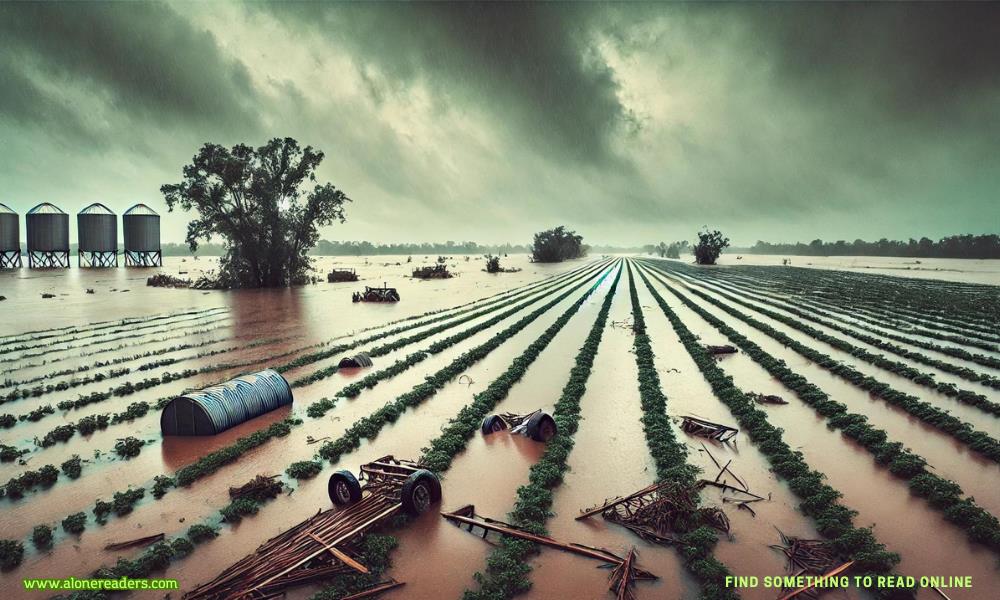
Tropical Storm Debby has left a trail of destruction across the southeastern United States, with Florida bearing the brunt of the damage. The storm, which made landfall earlier this week, unleashed record rainfall across the region, causing widespread flooding and significant agricultural losses. In Florida, known for its diverse and abundant crop production, farmers are facing devastating setbacks as the storm's aftermath continues to unfold.
Tropical Storm Debby brought unprecedented levels of rainfall to Florida and neighboring states, with some areas reporting over 20 inches of rain in just a few days. This deluge overwhelmed drainage systems, rivers, and lakes, leading to flash floods in urban and rural areas alike. The National Weather Service issued numerous flood warnings as the storm's slow-moving nature exacerbated the flooding, giving water little time to recede.
The flooding has been particularly severe in central and southern Florida, where the flat terrain allows water to spread quickly and remain stagnant for extended periods. Major rivers, including the St. Johns and Suwannee, swelled beyond their banks, inundating nearby farmland and residential areas. The damage is extensive, with roads, bridges, and homes submerged under feet of water.
Florida's agricultural sector, a vital part of the state's economy, has been hit hard by the flooding. The state is a leading producer of fruits, vegetables, and livestock, all of which have suffered significant losses due to the storm. Citrus groves, which produce over 70% of the nation’s oranges, have been particularly affected. Prolonged exposure to floodwaters can cause root rot in citrus trees, potentially leading to a reduction in both the quantity and quality of the fruit harvest.
Vegetable farms, which supply a large portion of the country’s winter produce, have also been devastated. Floodwaters have drowned fields of tomatoes, peppers, and lettuce, washing away soil nutrients and leaving behind mud and debris. The destruction of these crops is expected to lead to shortages and higher prices in grocery stores across the country in the coming months.
Additionally, Florida's livestock industry has suffered. Flooded pastures have left cattle and other livestock without adequate grazing areas, while poultry farms have seen significant losses as chickens and turkeys succumb to the rising waters. Farmers are scrambling to relocate surviving animals to higher ground and assess the full extent of the damage.
While Florida has experienced the most severe impact, the storm's effects have been felt across other states in the southeastern U.S. Georgia, Alabama, and South Carolina have all reported significant agricultural damage due to flooding. In Georgia, peanut and cotton farmers are facing severe losses as waterlogged fields threaten to destroy crops just weeks before harvest. Cotton bolls, which are highly sensitive to moisture, have begun to rot in the fields, while peanut plants are at risk of developing diseases due to the saturated soil.
In Alabama and South Carolina, soybean and corn farmers are contending with similar challenges. The excessive rainfall has led to waterlogged fields, which can stunt plant growth and reduce yields. Farmers in these states are closely monitoring their crops, hoping that drier weather in the coming days will help mitigate some of the damage.
The agricultural losses caused by Tropical Storm Debby are expected to have far-reaching economic implications. Florida’s citrus industry, already struggling with diseases like citrus greening, could see its production levels drop further, affecting not only farmers but also the juice and beverage industries that rely on a steady supply of oranges. The loss of vegetable crops could lead to supply chain disruptions, driving up prices for consumers and reducing availability in grocery stores nationwide.
The financial toll on farmers is significant. Many are facing the prospect of replanting entire fields, a costly and time-consuming process. Crop insurance will cover some of the losses, but for many farmers, it may not be enough to fully recover. The federal government is expected to provide disaster assistance, but the scale of the damage means that recovery will likely take months, if not years.
Beyond the immediate agricultural damage, there are concerns about the long-term environmental impact of the flooding. The floodwaters have carried pesticides, fertilizers, and other chemicals from farmland into rivers and streams, potentially contaminating water supplies and harming aquatic ecosystems. The influx of nutrients from fertilizers can lead to algal blooms, which deplete oxygen in the water and create dead zones where fish and other marine life cannot survive.
In addition, the erosion caused by the flooding has stripped topsoil from fields, reducing the land's fertility and making it more difficult for crops to grow in the future. Farmers will need to take steps to restore the health of their soil, which may involve adding organic matter, planting cover crops, and reducing tillage to prevent further erosion.
In response to the widespread flooding, state and federal agencies have mobilized to assist affected communities. The Federal Emergency Management Agency (FEMA) has declared a state of emergency in Florida and several other states, making federal funds available for disaster relief efforts. The U.S. Department of Agriculture (USDA) is also providing support to farmers, including emergency loans and technical assistance for crop recovery.
Local communities have come together to support one another, with volunteers helping to sandbag properties, distribute food and water, and rescue stranded livestock. Farmers are sharing resources and expertise, working together to salvage what they can from the wreckage of the storm.
Conclusion
Tropical Storm Debby has left a lasting mark on Florida and the southeastern U.S., with flooding causing extensive damage to both agriculture and infrastructure. As the waters begin to recede, the full extent of the storm's impact will become clearer. For the farmers whose livelihoods depend on the land, the road to recovery will be long and challenging. However, with the support of government agencies and their communities, they are determined to rebuild and continue providing the food and resources that sustain the nation.